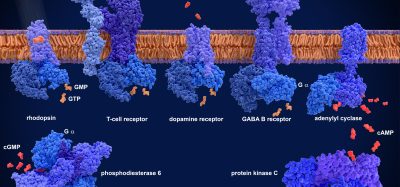New screening method identifies COVID-19 protein inhibitor
Posted: 3 September 2021 | Anna Begley (Drug Target Review) | No comments yet
Researchers use fast and cost-effective technology to identify the viral protein inhibitor Mpro as a potential drug against COVID-19.


A team at the Baylor College of Medicine, US, have used an innovative, fast and cost-effective drug discovery technology to screen billions of compounds for a potential treatment against viruses. Using this method, they were able to identify an inhibitor of a viral protein that is needed for propagation of viruses, specifically the COVID-19 virus SARS-CoV-2, called Mpro.
The more commonly used method for discovering drugs is high throughput screening (HTS), which involves screening at most a million compounds in individual test tubes which can be slow and expensive. The researchers instead used a method called DNA-encoded chemistry technology, which enabled them to screen four billion DNA-encoded molecules all in one test tube against a key SARS-CoV-2 protein to find a molecule that may modify how that protein behaves.
“It is a process that allows us to test over 1,000 times more compounds than the traditional process and at a much faster pace. We applied it to finding molecules that hit the viral protein Mpro,” explained co-contributing author Dr Damian Young.
Biomarkers aren’t just supporting drug discovery – they’re driving it
FREE market report
From smarter trials to faster insights, this report unpacks the science, strategy and real-world impact behind the next generation of precision therapies.
What you’ll unlock:
- How biomarkers are guiding dose selection and early efficacy decisions in complex trials
- Why multi-omics, liquid biopsy and digital tools are redefining the discovery process
- What makes lab data regulatory-ready and why alignment matters from day one
Explore how biomarkers are shaping early drug development
Access the full report – it’s free!
The method that the team used to screen their compounds is not entirely new and has been mostly applied to treating different forms of cancer. However, this is the first time that it has been reported to be effectively applied to COVID-19.
“The DNA-encoded chemistry technology process involves a simultaneous screen of billions of molecules in which each drug-like molecule is tagged with a DNA barcode,” said Dr Martin Matzuk, a co-contributing author. “The molecules that ‘stick’ to the protein are identified by sequencing of their attached DNA ‘barcode.’ This is a rapid drug discovery screen, and our study demonstrates the enormous potential to find unique molecules that can inhibit viruses and help in this and in future pandemics.”
The method identified Mpro , the SARS-CoV-2 main protease that is a key component for the lifecycle of coronaviruses and a therapeutic target that is independent of the current vaccine strategies. “By blocking Mpro with small molecules, we are blocking SARS-CoV-2 from replicating in cells. These studies are highly encouraging and indicate that this process could be used in the future for emerging viruses, including other coronaviruses,” commented co-first author Dr Srinivas Chamakuri.
The next steps to further test the inhibitor against Mpro against COVID-19 will involve animal models and other lab safety tests before it can begin human trials.
The findings were published in PNAS.
Related topics
Drug Targets, High-Throughput Screening (HTS), Molecular Biology, Molecular Targets, Protein, Screening, Small molecule, Target Molecule, Technology
Related conditions
Covid-19
Related organisations
Baylor College of Medicine
Related people
Dr Damian Young, Dr Martin Matzuk, Dr Srinivas Chamakuri








